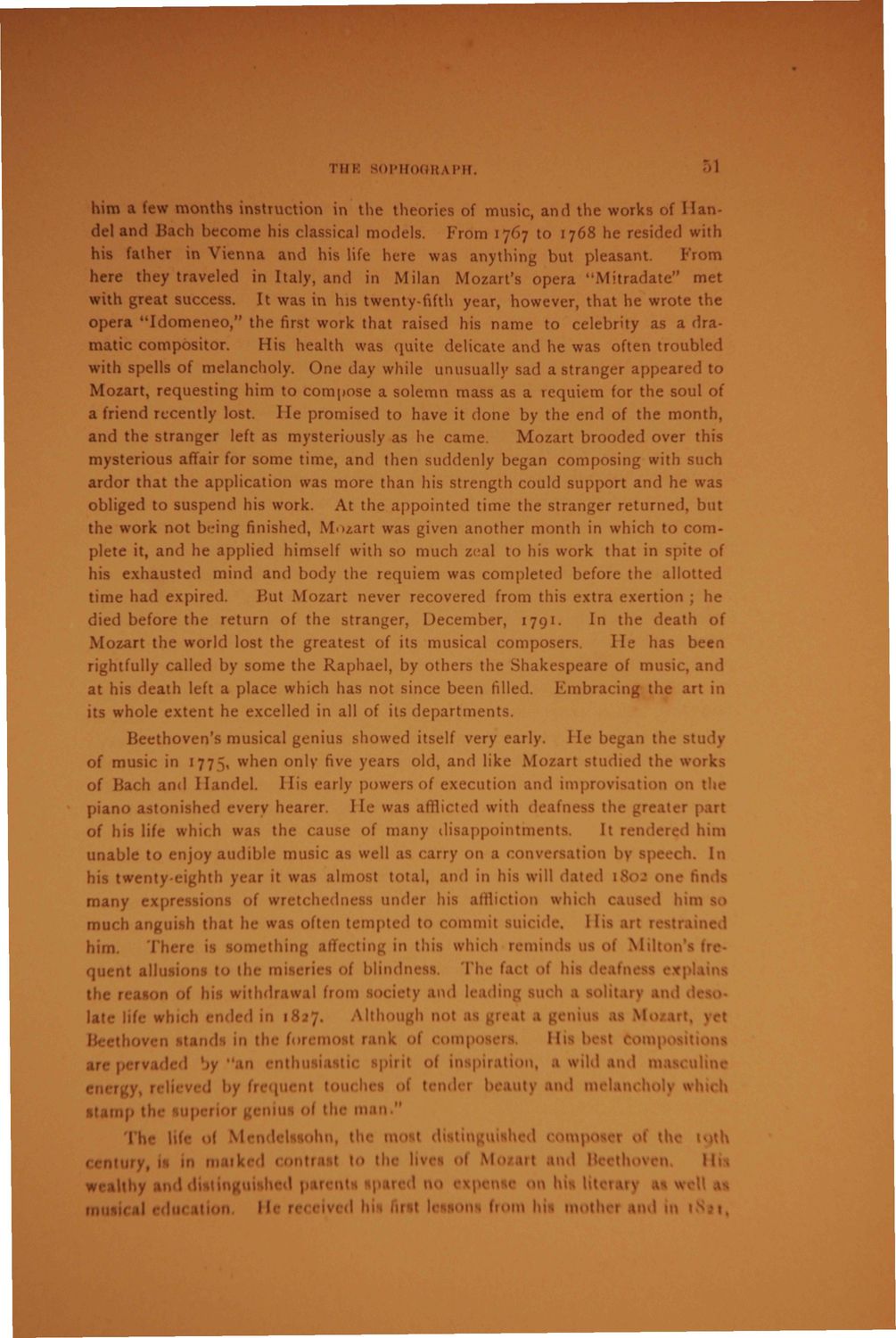| |
| |
Caption: Sophograph - 1889
This is a reduced-resolution page image for fast online browsing.

EXTRACTED TEXT FROM PAGE:
THE SOPHOGRAPH, him a f( lonths instruction in the theories of music, and the works of Uanlel and Bach 1 come his classical models. From 1767 to 1768 he resided wit) his father in Vienna and his life here was anything but pleasant. From here they traveled in Italy, and in Milan Mozart's opera Mitradate" met with great success. It was in his twenty-fifth year, however, that he wrote the opera "Idomeneo," the first work that raised his name to celebrity as a dra matic compositor. His health was quite delicate and he was often troubled with spells of melancholy. One day while unusually sad a stranger appeared to Mozart, requesting him to compose a solemn mass as a requii 1 for the soul of a friend recently lost. I le promised to have it done by the end of the month and the stranger left as mysteriously as he came. Mozart brooded over this mysterious affair for some time, and then suddenly began composing with such ardor that the application was more than his strength could support and he was obliged to suspend his work. At the appointed time the stranger returned, but the work not being finished, Mozart was given another month in which to complete it, and he applied himself with so much zeal to his work that in spite of his exhausted mind and bod the requiem was completed before the allotted time had expired. But Mozart never recovered from this extra exertion ; he died before the return of the stranger, December, 1791. In the death of Mozart the world lost the greatest of its musical composers. He has been rightfully called by some the Raphael, by others the Shakespeare of music, and at his death left a place which has not since been filled. Fmbracing the art in its whole extent he excelled in all of its departments. Beethoven's musical genius showed itself very early. He began th< tudy of music in 1775, when only five \ irs old, and like M art studied the work of Bach and Handel His early powers of execution and improvi >n on th iano astonished every hearer. He was afflicted with 1 afness the greater part of his life which was the cause of many di ppointmenl It rein! d him nable to enjoy audible music as \ II irry on a convei >n 1 ch. In twenty-* ith y r it was almost total, and in his will dated 1 finds many expressions ol wretchedm under his affliction wl h 1 1 him much anguish that h often t< ipt I to commit uicide, H rt ned m There is something a acting in this win 1 remit Milton uent allusions tries ol blindm The fact of hi gplati th< asf his withdr. al from id lead in » a lit.uv and d< late life wl » e n 1827. Althoi h i t a it a gentui M tart, ) Beetl Htai in the foi k < t • mposci > lli^ nj us an va I hu «>i inspi i, .1 wild .u\<\ ma aim ci r < by freq M • of 1 indi au ami mi wl at* geniui a 1 he III ' Men ny, IH in maiki althy ;i ihi th m t 1 tit i" the 11\ pari I *pa ihed 1 m| \i art ml 1 I his lit it) • th II Rt w u 11 * i\ r<l 1 He 1 dI from h and in 1,
| |